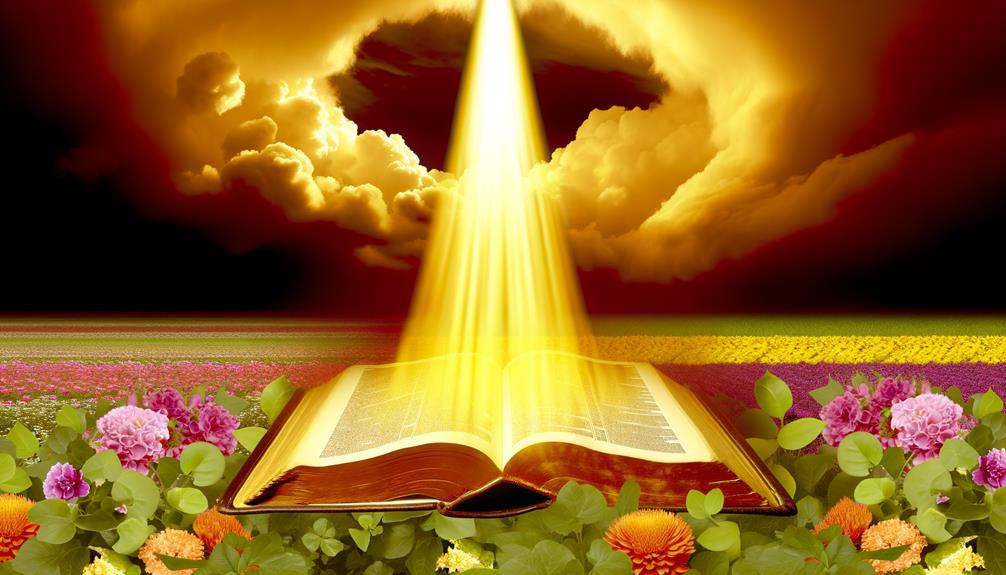Let There Be Light Bible Verse Meaning: Revelation
The phrase ‘Let there be light‘ in Genesis 1:3 signifies the commencement of divine creation, transforming primordial chaos into an ordered cosmos. This moment reflects God’s omnipotent command, introducing light as a foundational and structuring element of the universe.
In Scripture, light symbolizes divine presence, purity, guidance, truth, and wisdom, serving as a metaphor for spiritual enlightenment. The juxtaposition of light and darkness underscores the transformative power of divine illumination and the shift from confusion to clarity.
This profound statement invites contemplation on the interplay between divine authority and creation, beckoning further exploration into its theological and spiritual depths.

Let There Be Light Bible Verse Meaning: Insights from Genesis 1:3
| Aspect | Explanation |
|---|---|
| Verse Reference | Genesis 1:3: “And God said, ‘Let there be light,’ and there was light.” |
| Literal Meaning | God’s command to create light, marking the beginning of the creation process and order in the universe. |
| Biblical Context | Occurs on the first day of creation, demonstrating God’s power to bring light and life into darkness. |
| Spiritual Symbolism | Light symbolizes God’s presence, truth, knowledge, and guidance. It reflects His power to overcome darkness. |
| Relation to Jesus | Often linked to John 8:12, where Jesus declares, “I am the light of the world,” connecting light to salvation. |
| Life Application | Encourages believers to seek God’s light in their lives, overcoming spiritual darkness and reflecting His truth. |
| Key Lesson | God’s word has the power to create, illuminate, and bring order. Trusting His word leads to spiritual enlightenment. |
The Genesis Context

In the Genesis account, the phrase ‘Let there be light‘ marks the initial act of divine creation, serving as a pivotal moment in the theological narrative. This declaration, found in Genesis 1:3, initiates the transformation from primordial chaos to an ordered cosmos, reflecting God’s omnipotence and intentionality.
The text situates this event at the very beginning of the Biblical creation story, underscoring the significance of light as a foundational element. The divine command not only introduces physical light but also symbolizes the illumination of divine wisdom and the inception of life.
Analyzing this context reveals the profound theological implications, emphasizing God’s sovereignty and the foundational role of light in structuring the universe according to divine will.
Understanding ‘Light’

The concept of ‘light’ in the Biblical narrative encompasses both a physical phenomenon and a profound symbol of divine presence and knowledge.
Light, in its physical form, represents creation’s first act, marking the change from chaos to order.
Symbolically, ‘light’ is often associated with God’s purity, guidance, and revelation. Throughout Scripture, light serves as a metaphor for truth, wisdom, and the divine nature of Christ, who is described as the ‘Light of the World‘ (John 8:12).
This dual aspect—literal and metaphorical—invites believers to perceive light as a manifestation of God’s will and an invitation to spiritual enlightenment.
The Creation Narrative

Genesis 1:3 marks a pivotal moment in the Creation Narrative, where God’s command, ‘Let there be light,’ initiates the shift from primordial darkness to an ordered cosmos.
This divine utterance is not merely a physical illumination but symbolizes the inception of divine order and purpose. The verse underscores the authoritative power of God’s word in transforming chaos into a harmonious creation.
Analyzing this passage reveals the foundational role light plays in the theological framework of creation, setting a precedent for the unfolding acts of creation. This moment exemplifies divine sovereignty and the intentionality behind the cosmos, inviting believers to contemplate the profound interplay between divine command and the reality it manifests.
Light Vs. Darkness

The biblical juxtaposition of light and darkness serves as a profound metaphor for spiritual enlightenment versus ignorance.
Light, often symbolizing divine presence and truth, stands in stark contrast to darkness, which represents spiritual blindness and separation from God.
This dichotomy underscores the transformative power of divine illumination in guiding believers from a state of confusion to one of clarity and purpose.
Symbolism in Biblical Light
In biblical literature, light consistently symbolizes divine purity, truth, and guidance, standing in stark contrast to the darkness that represents evil, ignorance, and chaos.
From the opening verses of Genesis, where God commands, ‘Let there be light,’ to the Gospel of John, which proclaims Jesus as the ‘light of the world,’ light serves as a profound metaphor for God’s presence and righteousness.
This symbolism underscores the transformative power of divine illumination, which dispels the shadows of sin and confusion. Light not only reveals the path of righteousness but also signifies the wisdom and clarity imparted by divine revelation.
Consequently, light in the Bible is an enduring emblem of spiritual awakening and moral clarity, guiding believers towards a life aligned with divine will. Moreover, this illumination not only reveals the path of righteousness but also serves as a beacon for understanding one’s purpose in life. In this journey, dreams and their biblical significance play a critical role, offering insights and messages that can lead to deeper revelations about oneself and one’s relationship with God. As believers reflect on their dreams, they may find that these nocturnal visions often embody themes of hope, guidance, and the divine potential waiting to be realized.
Darkness as Spiritual Blindness
Darkness in biblical texts often symbolizes spiritual blindness, representing a state of moral and intellectual ignorance that estranges individuals from divine truth and enlightenment. This metaphor is pervasive in scripture, illustrating the stark contrast between light, which signifies divine wisdom and purity, and darkness, which connotes sin and disconnection from God. Understanding this dichotomy is essential for comprehending the transformative power of spiritual illumination.
- Moral Ignorance: Darkness reflects a life devoid of righteous principles.
- Intellectual Blindness: It signifies a lack of understanding or knowledge of God’s will.
- Estrangement from God: Darkness implies a separation from the divine presence.
- Sin and Corruption: It is often associated with immoral behaviors and thoughts.
This analysis highlights the profound implications of spiritual light in overcoming darkness.
Symbolism in Scripture

In Scripture, light frequently symbolizes the presence and guidance of the Divine, serving as a metaphor for God’s illumination in the moral and spiritual domains.
The contrast between light and darkness underscores the perpetual struggle between good and evil, knowledge and ignorance.
This dichotomy invites believers to seek divine enlightenment as a path to spiritual clarity and righteousness.
Light as Divine Presence
The concept of light in Scripture often symbolizes the divine presence, signifying God’s purity, guidance, and the revelation of truth. The biblical narrative richly employs light to reflect God’s intrinsic nature and His relationship with humanity. This symbolism can be seen throughout various passages, imbuing them with profound theological significance.
Creation: God’s command, “Let there be light” (Genesis 1:3), marks the inception of divine order.
Guidance: The pillar of fire provided light for the Israelites (Exodus 13:21).
Revelation: Light reveals hidden truths and divine wisdom (Psalm 119:105).
Purity: Light represents God’s holiness and moral perfection (1 John 1:5).
Presence: Jesus as the ‘light of the world’ (John 8:12) embodies divine presence on Earth.
Through these elements, scripture illuminates the multifaceted nature of God’s light.
Light Vs. Darkness
Throughout Scripture, the interplay between light and darkness serves as a potent symbol of the cosmic battle between good and evil, illustrating the moral and spiritual dichotomy inherent in the human condition.
Light frequently represents divine truth, purity, and the presence of God, as exemplified in passages like John 1:5, where ‘the light shines in the darkness, and the darkness has not overcome it.’
Conversely, darkness symbolizes ignorance, sin, and separation from God.
This dichotomy is not merely poetic but serves as a theological framework, encouraging believers to seek righteousness and eschew moral corruption.
Theological Interpretations

Examining the theological interpretations of ‘Let there be light’ reveals a profound exploration of divine illumination and its implications for understanding God’s creative authority. This phrase, found in Genesis 1:3, is often seen as the initiation of God’s sovereign act of creation.
Theologically, it signifies the manifestation of divine order out of chaos, symbolizing God’s omnipotence and wisdom. Scholars and theologians have investigated its layered meanings, offering insights into its spiritual and doctrinal significance.
- Divine Command: Reflects God’s authoritative word bringing reality into existence.
- Spiritual Enlightenment: Represents the illumination of human understanding through divine revelation.
- Moral Clarity: Suggests the establishment of moral order against the backdrop of chaos.
- Creation Ex Nihilo: Emphasizes creation from nothing, highlighting God’s unmatched power.
This exploration underscores the depth and richness of biblical texts in conveying complex theological truths.
Light in Human Experience

In human experience, light has often been perceived as a powerful symbol of knowledge, hope, and spiritual awakening. Throughout history, light has served as a metaphor for clarity and enlightenment, guiding individuals from darkness into understanding and wisdom. This symbolism permeates various aspects of life, reflecting the profound impact of illumination on the human psyche.
| Aspect | Symbolic Meaning |
|---|---|
| Knowledge | Enlightenment and clarity |
| Hope | Optimism and new beginnings |
| Spiritual Awakening | Connection with the divine |
| Guidance | Direction and purpose |
| Wisdom | Insight and understanding |
Thus, the presence of light is not merely physical but also an essential component of the human quest for meaning and transcendence.
Light in Other Religions
Light serves as a profound and multifaceted symbol across various religious traditions, embodying themes of divinity, purity, and transcendence.
In Hinduism, light is celebrated during Diwali, symbolizing the victory of light over darkness and knowledge over ignorance.
Buddhism employs light in rituals to represent enlightenment and the dispelling of ignorance.
In Zoroastrianism, light is a core element, symbolizing Ahura Mazda’s divine presence.
Islamic traditions use light to denote guidance and divine wisdom, as seen in the famous ‘Light Verse’ of the Quran.
In Judaism, the menorah’s light during Hanukkah commemorates the miracle of light and divine intervention.
These diverse religious perspectives illustrate light’s universal significance as a spiritual metaphor.
- Hinduism: Diwali
- Buddhism: Enlightenment
- Zoroastrianism: Ahura Mazda
- Islam: Light Verse
Modern Reflections

Contemporary interpretations of the phrase ‘Let there be light’ reveal its enduring relevance in both spiritual and secular contexts, encapsulating humanity’s timeless quest for knowledge, clarity, and enlightenment. In the modern era, this phrase resonates within various disciplines, from scientific endeavors to philosophical discourses, symbolizing the illumination of truth and wisdom.
| Context | Interpretation |
|---|---|
| Spiritual | Divine revelation and moral insight |
| Scientific | Discovery and innovation |
| Educational | Pursuit of knowledge and understanding |
| Philosophical | Enlightenment and existential clarity |
This multifaceted usage highlights the phrase as a metaphorical beacon guiding humanity towards a deeper comprehension of the universe and our place within it, bridging the divine with the empirical, the ancient with the contemporary.
Conclusion
The phrase ‘Let there be light‘ from the Genesis narrative is laden with profound theological and symbolic significance. This primordial command not only initiates the creation process but also establishes a dichotomy between light and darkness, resonating throughout scripture and human experience.
What deeper mysteries lie within this divine utterance? The exploration of light’s multifaceted symbolism, across religious traditions and modern interpretations, beckons further contemplation, urging one to ponder its ultimate spiritual implications.






